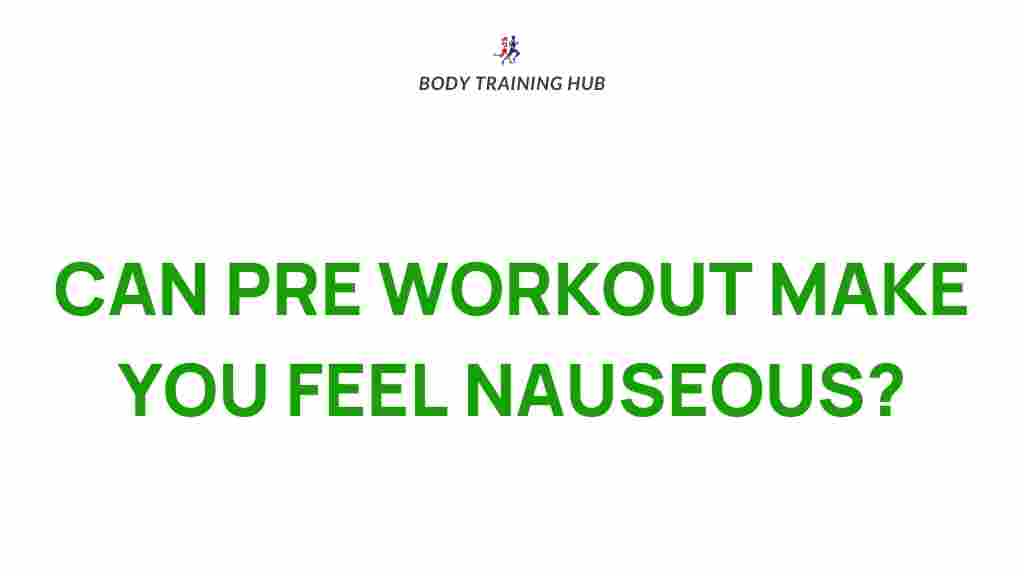Can Pre-Workout Supplements Cause Nausea?
Pre-workout supplements are a popular choice for fitness enthusiasts looking to boost energy, endurance, and focus during their workouts. However, some users report experiencing nausea after taking pre-workout. This article dives into the possible reasons behind this and provides practical solutions to help you get the most out of your pre-workout experience without discomfort.
What Are Pre-Workout Supplements?
Pre-workout supplements are typically a mix of ingredients designed to enhance your performance during exercise. Common components include:
- Caffeine: For increased energy and focus.
- Beta-alanine: To reduce fatigue and improve endurance.
- Creatine: For improved strength and power output.
- L-citrulline: To boost blood flow and reduce muscle soreness.
While these ingredients are effective, the combination and dosage can sometimes lead to side effects, including nausea.
Why Does Pre-Workout Cause Nausea?
There are several reasons why pre-workout may cause nausea. Understanding these factors can help you troubleshoot and prevent the issue:
1. Overdosing on Stimulants
Most pre-workouts contain caffeine, which can cause nausea if consumed in high doses. Your body’s tolerance to caffeine plays a significant role here.
2. Taking Pre-Workout on an Empty Stomach
Pre-workouts can be harsh on the stomach lining, especially when consumed without food. This can trigger feelings of nausea.
3. Poor Mixing or High Concentration
Failing to properly dilute your pre-workout powder may lead to gastrointestinal distress, including nausea.
4. Sensitivity to Ingredients
Some individuals may be sensitive to specific ingredients like beta-alanine or artificial sweeteners, both of which are common in pre-workouts.
5. Exercise Intensity
High-intensity workouts combined with pre-workout supplementation can sometimes overwhelm the digestive system, leading to discomfort or nausea.
How to Prevent Nausea from Pre-Workout Supplements
If pre-workout supplements are causing nausea, there are steps you can take to minimize or eliminate this side effect:
1. Adjust the Dosage
Start with half the recommended dose of your pre-workout supplement to assess your tolerance. Gradually increase as needed.
2. Consume Food Beforehand
Having a small, balanced meal 30–60 minutes before taking pre-workout can cushion your stomach and prevent nausea.
3. Stay Hydrated
Ensure you’re drinking enough water when mixing your pre-workout and throughout your workout. Proper hydration aids digestion and reduces side effects.
4. Choose a Low-Stimulant Formula
If caffeine is the culprit, opt for a low-stimulant or stimulant-free pre-workout. There are various options on the market that cater to sensitive users.
5. Check Ingredient Labels
Review the ingredient list for anything you may be sensitive to, such as artificial sweeteners or certain amino acids.
6. Consult a Healthcare Professional
If the issue persists, it’s wise to speak with a healthcare provider to ensure your supplement choices align with your unique health needs.
Troubleshooting Nausea After Taking Pre-Workout
If you’ve already taken pre-workout and are feeling nauseous, here’s what you can do:
- Sit or Lie Down: Resting can help calm your digestive system.
- Drink Water: Sip water slowly to stay hydrated and alleviate stomach discomfort.
- Avoid High-Intensity Exercise: Consider switching to light activity or postponing your workout until the nausea subsides.
- Consider Ginger: Ginger tea or supplements can help soothe an upset stomach.
Choosing the Right Pre-Workout for Your Body
Not all pre-workouts are created equal. To find the best fit for your needs:
- Read Reviews: Look for user feedback on specific products.
- Start Simple: Try a single-ingredient supplement like caffeine or creatine before progressing to complex formulas.
- Experiment with Timing: Some people may benefit from taking pre-workout 15–30 minutes earlier than usual.
For more guidance, check out our comprehensive pre-workout guide to explore tips and product recommendations.
Are There Alternatives to Pre-Workout Supplements?
If you’re prone to nausea or prefer natural solutions, here are some alternatives:
- Coffee: A natural source of caffeine to boost energy.
- Bananas: Provide quick carbohydrates for fuel and electrolytes to maintain hydration.
- Beet Juice: Known for enhancing endurance and blood flow.
These options can deliver a similar performance boost without the risk of artificial ingredients causing nausea.
Conclusion
Nausea from pre-workout supplements can be a frustrating side effect, but it’s not inevitable. By understanding the causes, adjusting your approach, and choosing the right product, you can enjoy the benefits of pre-workout without the discomfort. If nausea persists, consulting a professional or exploring alternatives may be the best course of action. Remember, every body is unique, so what works for someone else may not work for you.
Take control of your fitness journey with informed choices and a proactive approach to supplement use. To learn more about maximizing your workout performance, check out our related articles!
This article is in the category Myths & Facts and created by BodyTraining Team
